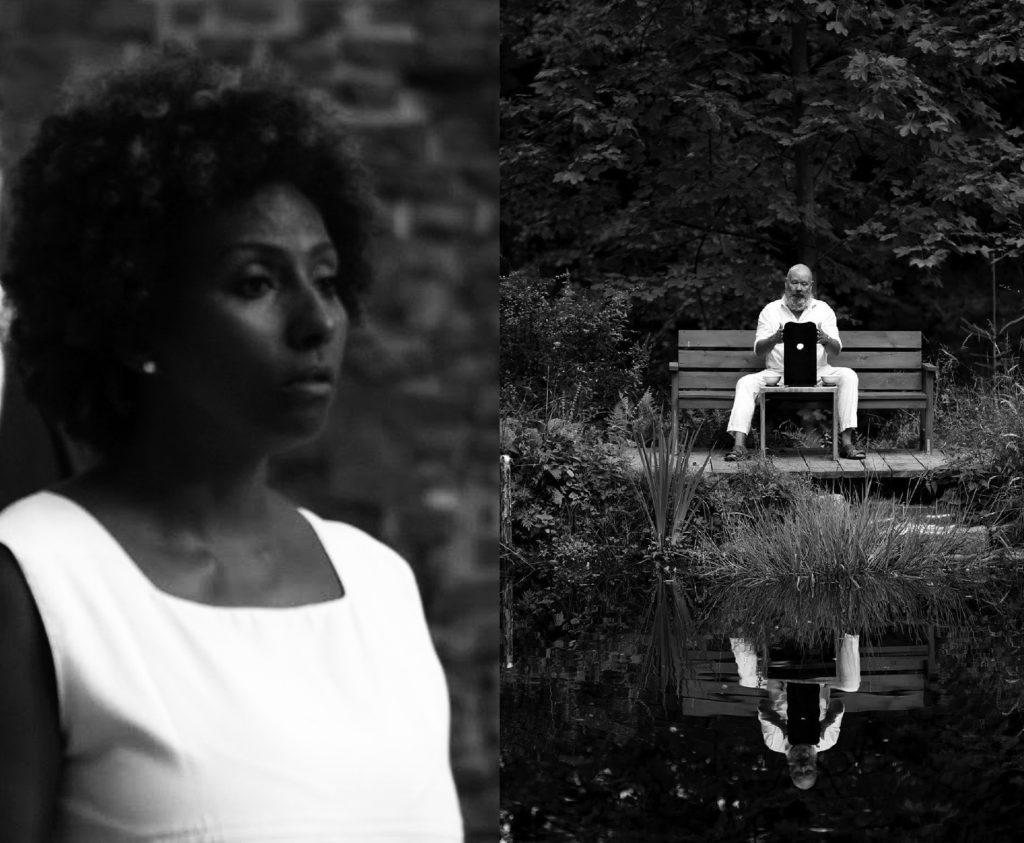I LOST MYSELF IN FINDING YOU
In this trio, wonderful Egyptian performer Rasha Ragab is joined by Christoph Nicolaus on the stone harp and Lucio Capece on bass clarinet.
Between singing and reciting, Rasha Ragab, going from one activity to the other with delicacy, freedom and ambiguity, presents old sufi poems in Arabic. The poems selected by Rasha are filled with great poetry, poignancy, transcendence and beauty. The texts have been written by Rabi’a Al-‘Adawiyya and Al-Hallaj. Rabi’a was the first Muslim saint woman, born in Basra, Iraq between around 714 AD and died in her 80s. Al-Hallaj, was born March 26th 858 AD in Fars, Persia. He was executed at his birthday
in March 26th 922 AD in Baghdad, Iraq.
In both cases texts are devotional. Sufism or Tasawwuf as it is known in the Muslim world, is a mystic path mostly widespread in Islam. Sufis describes it as the Path of Love where the human soul searches out God, and if the grace of God falls upon the searcher, then he or she finds fana (annihilation) in God and, ultimately, baqa or eternal existence in the consciousness of God.
“Considering these texts we decided to play the tones of the stone harp one by one from low to high in the pitch spectrum. In this specific instrument to do that implies to move slowly the hands from back to front. Both movements: from low to high, and from back to front represent the spirit of
ascension towards the spiritual and of offering towards the listeners and other humans and creatures that we wanted to consider as main aspects of the piece. After deciding this basic idea, that gave a structure to the piece, we found dynamics of time presence of the texts in the structure, and ways to do it were decided by Rasha, moving intuitively from reciting to singing, staying specially in-between both possibilities.”
Capece figured out series of multi phonics and pure tones in the bass blarinet interacting with the stone harp, trying to give special presence in the piece to hidden overtones that become present as very delicate beatings once they are triggered by the stone harp. In all the multi phonics that
Capece plays one of the overtones is close or is a unison of the stone harp tone that is played each time.

To book I LOST MYSELF IN FINDING YOU please contact:
Joanna John / hello@kissthefrog.no
The stone harp is an extremely beautiful instrument, that rubbed with wet hands produces pure harmonics, that we can only relate to pure sine tones, that in this case are produced in a totally acoustic way. Christoph has played this instrument for several years. He owns 7 of these stones.
Each stone needs several years of practicing in order to reach it´s own stable tone. The basic sonic structure of the piece was thought by Capece, taking as a reference the way the tones come out from the stone harp just playing it starting close to the body of the performer and moving the hands, playing one tone after the other, in the direction of the audience, as an offering, and in ascension. The tones played in this direction do not create a scale as in traditional instruments. The sounds of the stone harp are combined with micro-tonally pitched tones and multi phonic material researched and played by Lucio in the bass clarinet.
The voice, stone and wood work together in this piece as an attempt to find in the most basic and old elements of life, depth in simplicity. As well as the wisdom and elegance of early muslim texts.
Trio started to work together in 2018, playing concerts in Munich and Berlin. Working on the same piece since then, playing it live, rehearsing and re-shaping it.
Rasha Ragab – born in Cairo in 1971, is a performance artist, singer, artist and curator in the Museum of Modern Art in Cairo. Active as an artist since 2003. She lives and works in Munich and Cairo.
Christoph Nicolaus – born in 1962 in Munich, is an artist, musician, curator and organizer of various art events, i.e. from Kunst im Bau and Klang im Dach. Exhibitions, concerts, performances and multimedia projects at home and abroad since 1994. He lives and works in Munich and Cairo.
About Lucio you can read here.
